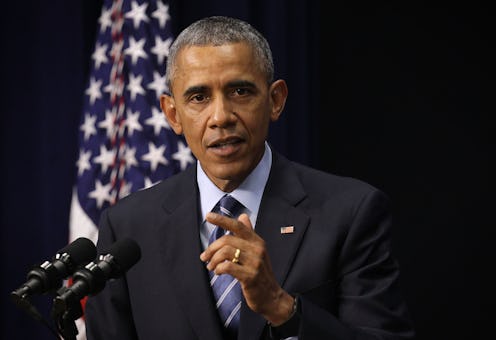News
Obama Stands Up For The Voting Rights Act
On Aug. 2, The New York Times Magazine published a cover story about the efforts over the last 50 years to dismantle protections within the Voting Rights Act of 1965. The act was passed to break down barriers that were meant to keep black people from voting, such as literacy tests. The magazine said that the story generated an unusual volume of letters to the editor, including one from President Barack Obama. Obama's letter on the Voting Rights Act says that if we don't help protect it against new restrictions passed by the states, then we are letting down the men and women who fought for the right to vote in the '60s.
Before 1965, a number of states, specifically in the South, had barriers written into law which prevented black people from voting. They used literacy tests, poll taxes, or simply made it extremely difficult for black people to register to vote. Then, on March, 7, 1965, state troopers attacked peaceful marchers on the Edmund Pettus Bridge in Selma, Alabama, as they were marching to the state capitol in Montgomery in a demonstration to push for voting rights. The violence was so horrific that President Lyndon B. Johnson was forced to call for a widespread voting rights law. His call was turned into hearings, and the hearings led to the passage of the Voting Rights Act.
The act did away with the literacy tests and poll taxes, and it "provided for federal oversight of voter registration in areas where less than 50 percent of the nonwhite population had not registered to vote." Martin Luther King Jr. spoke at the ceremony where the Act was signed into law. Per The New Republic:
Voting is the foundation stone for political action. The basic elements so vital to Negro advancement can only be achieved by seeking redress from government at local, state and federal levels. To do this the vote is essential.
What Has Happened Since Its Passage?
Unfortunately, states in the South have made a recent effort to pull back some of the act's protections. In 2013, the Supreme Court struck down what the New York Times called the "heart of the Voting Rights Act" in a 5-4 vote, which freed nine states to change their election laws without federal approval. The vote was divided along ideological lines, and at the heart of the dispute was whether minorities still face barriers when voting, especially in states with a history of discrimination. Chief Justice John Roberts said that we need legislation which "speaks to current conditions."
Shortly after the decision, Texas announced that a voter ID law that had been blocked by state courts would immediately go into effect, and that redistricting maps there wouldn't need federal approval anymore. Since 2010, at least 22 states have passed voting restrictions that include voter identification laws, registration restrictions, and reduced early voting, according to the Brennan Center for Justice.
Voting rights advocates (and some Supreme Court justices) argue that most of these laws disproportionately affect minorities and the elderly, who often don't have the money or transportation to get ID cards or make it to the polls (early or absentee voting is sometimes their only option). And these arguments have been verified. A 2014 nonpartisan congressional study found that states that toughened their voter ID laws saw significant drops in voter turnout, and most of those who didn't show up to the polls were minorities and young people, according to Politico.
Obama's Call In His Letter To The Editor
Obama's letter said that Jim Rutenburg's Times Magazine article should be a call to anyone who wants to protect equal access to a vote for everyone:
... as Rutenberg chronicles, from the moment the ink was dry on the Voting Rights Act, there has been a concentrated effort to undermine this historic law and turn back the clock on its progress. His article puts the recent push to restrict Americans’ voting rights in its proper context. These efforts are not a sign that we have moved past the shameful history that led to the Voting Rights Act. Too often, they are rooted in that history. They remind us that progress does not come easy, but that it must be vigorously defended and built upon for ourselves and future generations.
Obama spoke of our deep-rooted history of systemic racism. And even if these restrictions aren't rooted in racism, some have argued that they are probably rooted in a political goal to stop black and young people from voting, because these people often vote for Democrats. Obama wrote that it's on the American people to make sure that the work of voting rights activists like Rosanell Eaton wasn't done in vain. Eaton was forced to recite the Preamble of the constitution in order to vote, and Obama said that's something we never want to return to.
Rosanell is now 94 years old. She has not given up. She’s still marching. She’s still fighting to make real the promise of America. She still believes that We the People have the awesome power to make our union more perfect. And if we join her, we, too, can reaffirm the fundamental truth of the words Rosanell recited.
